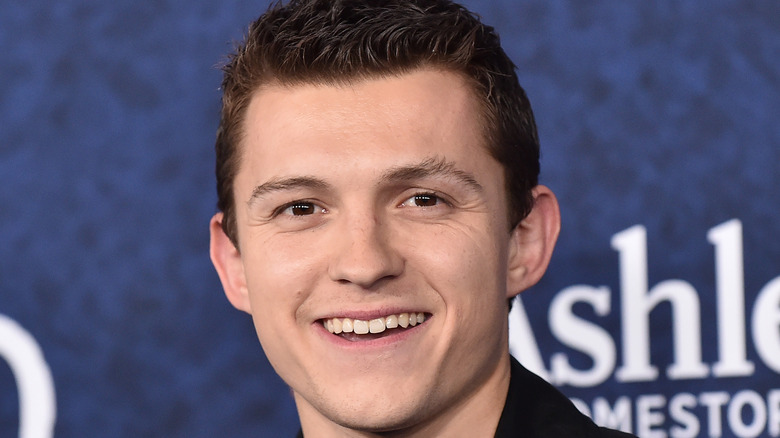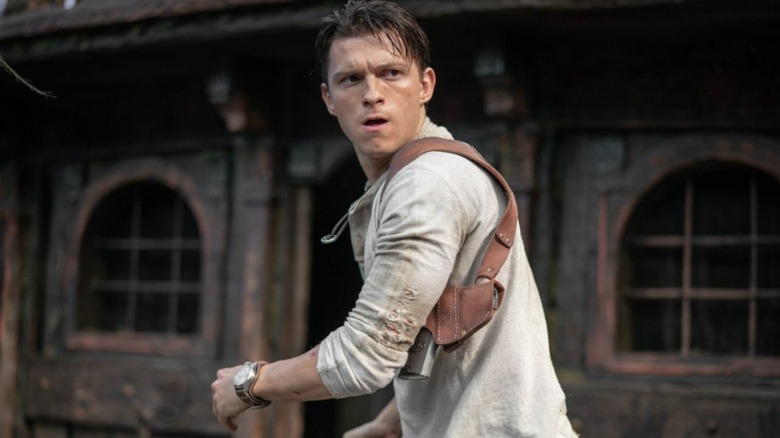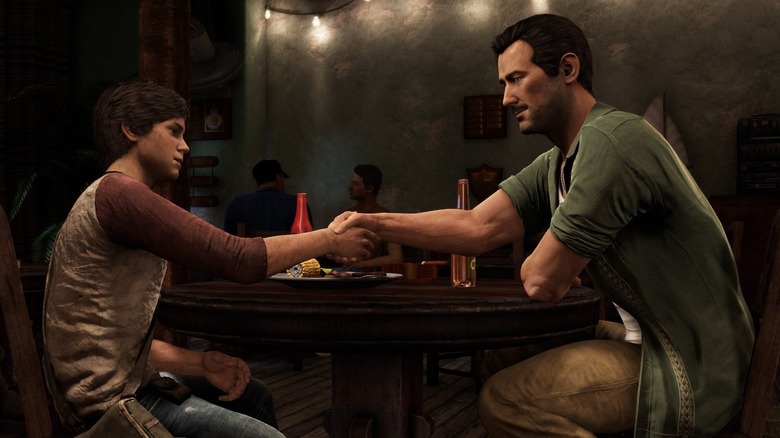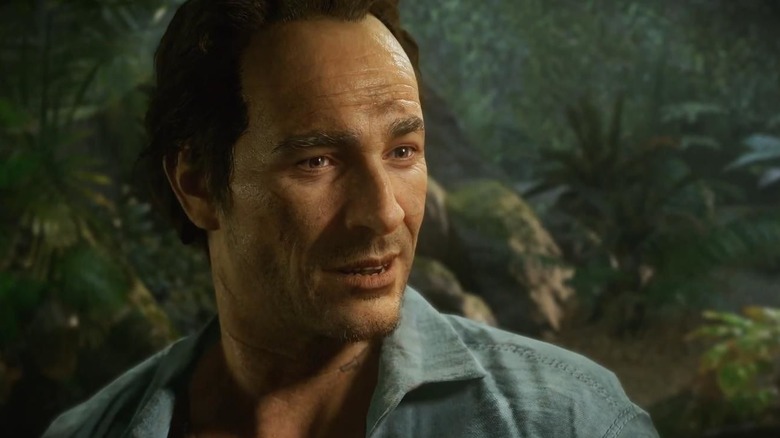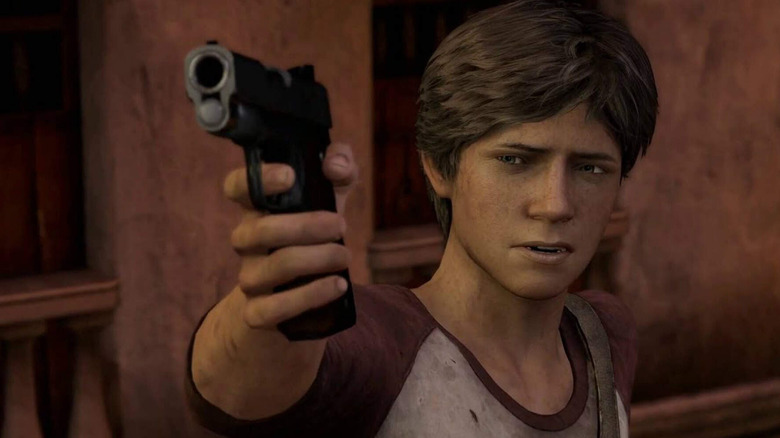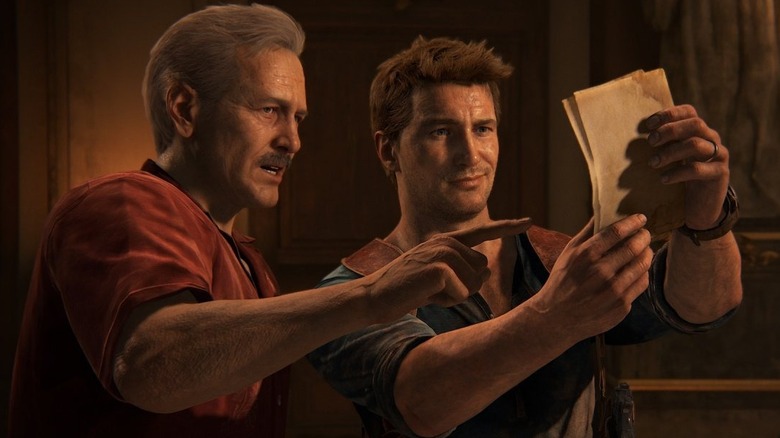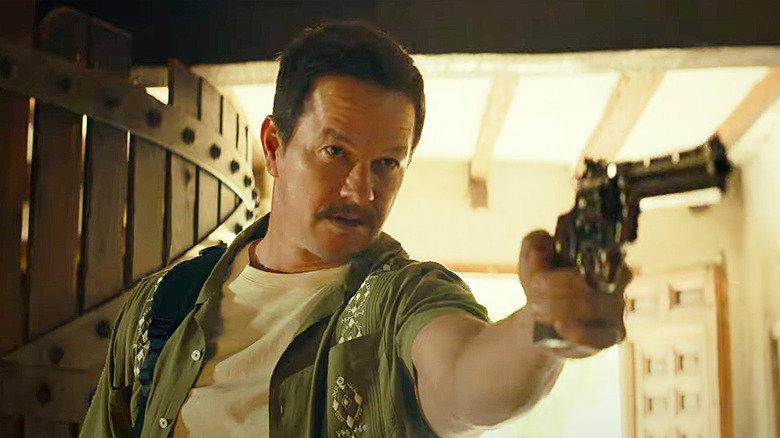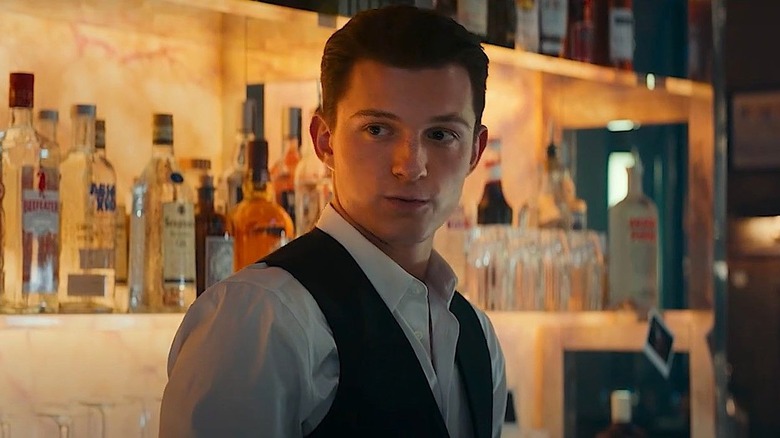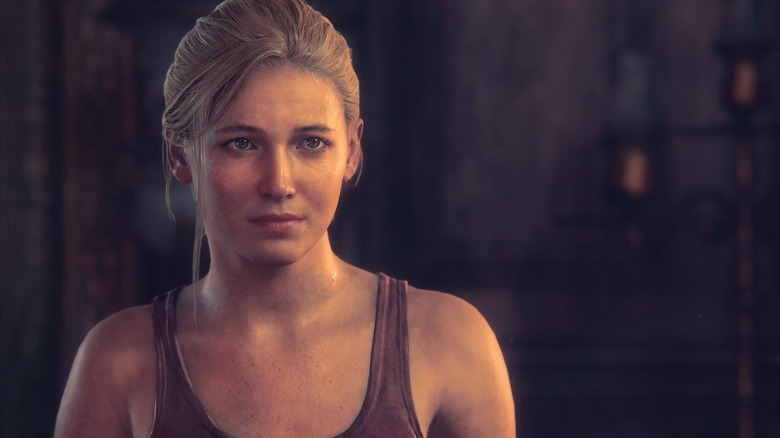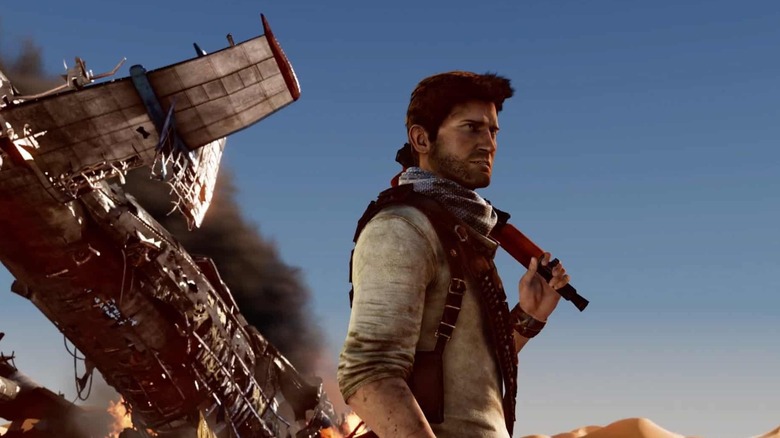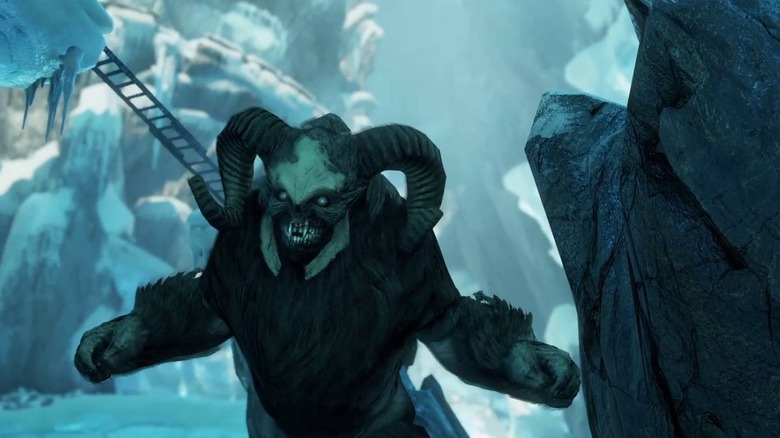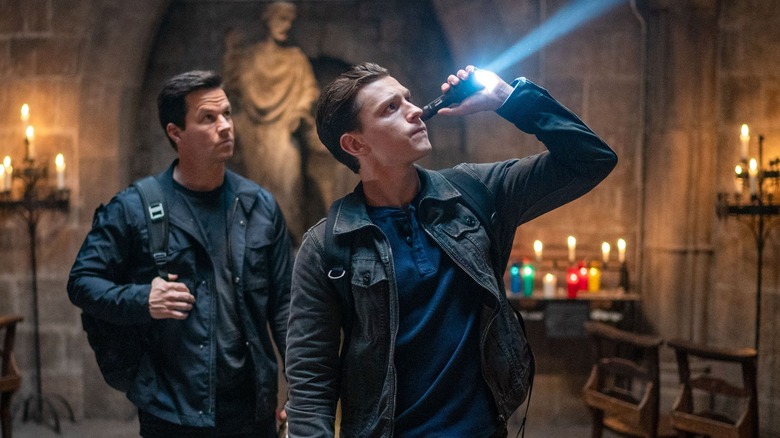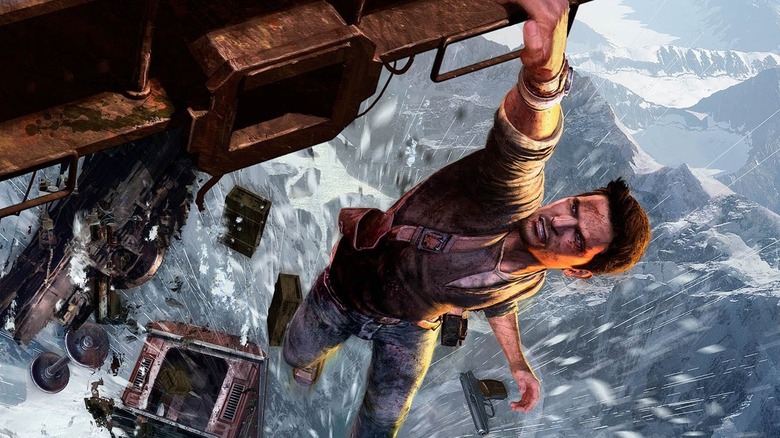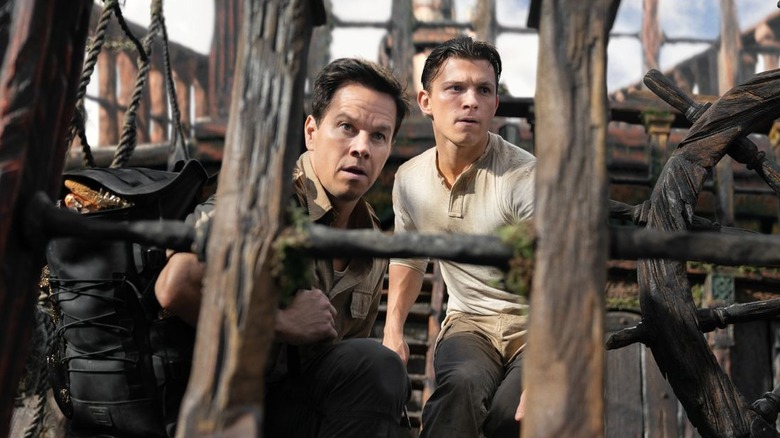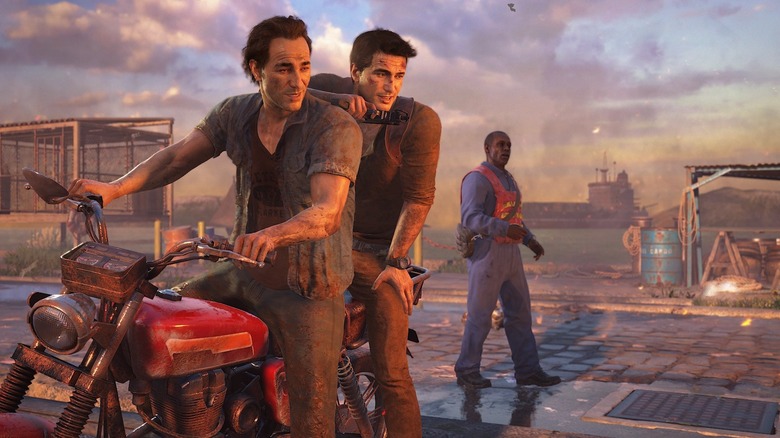The Biggest Differences Between The Uncharted Movie And Video Games
Since it began in 2007, the "Uncharted" franchise has pulled heavily from the traditions of Hollywood. The video games have received high praise for their cinematic quality, pushing the limits of what interactive media can accomplish in terms of characters, storytelling, and of course, action. That legacy would seem to make "Uncharted" a perfect fit for the big screen, and Sony Pictures' new film attempts that transition with Tom Holland as lead protagonist Nathan Drake and Mark Wahlberg as his mentor figure Victor "Sully" Sullivan.
On paper, the "Uncharted" movie has a lot in common with the video games. Whole action sequences like the midair cargo plane battle and the auction heist are lifted straight out of "Uncharted 3" and "Uncharted 4," Nate climbs on "and falls from" a bunch of rickety old stuff, and several popular characters show up to help push the story along. However, the new "Uncharted" also makes a lot of big changes to the source material. Origin stories are altered, the tone is very different, and even the most established characters experience some pretty big changes in their motivations and personalities.
Of course, bringing a story from one medium to another always necessitates some tweaks and adjustments. Just as books must be truncated to fit the big screen, so too must video games — albeit with a somewhat less impressive track record. Here are the biggest differences between the "Uncharted" movie and the video games and how they stack up against each other.
All the Uncharted characters are different ages
To start off, the "Uncharted" film takes a lot of liberty with the ages of its core characters. It's technically a prequel, so younger characters make sense, but not everyone is aged down equally. Nate and Chloe (Sophia Ali) seem to be about the same age, which stays true to the games, and the age gap between Nate and his older brother Sam (Rudy Pankow) is also accurate to the source material. Sully, on the other hand, is significantly changed.
In the games, Sully is about 25 years older than Nate. Given that Tom Holland's version of Nate is said to be 25 years old in the movie and that Mark Wahlberg is 50, that might not seem like too big of a change. But Wahlberg's Sully seems like he's meant to be more like 40 — a decade of difference that shifts the relationship between the two characters quite a bit. In the movie, Sully seems to be in his prime, and it's implied that he has a romantic past with villain Jo Braddock (Tati Gabrielle), who can't be much older than 30. Everything about the way Sully is written and played gives the impression of a fortune hunter at the peak of his game, with none of the "too old for this" energy that he possesses in the games.
Sully is no longer a father figure to Nate
Shrinking the age gap between Nate and Sully has a big impact on their relationship in "Uncharted." In the games, the two meet when Nate is just a teenager. As such, the foundation of their relationship is more of a surrogate father/son dynamic. Nate is largely alone in the world, and his own parents are long gone. Sully sees similarities between them and takes Nate under his wing, teaching him the ropes and bringing him along on various jobs. As Nate grows older, the two develop much more of a peer relationship, but there's always a major generational divide between them.
The "Uncharted" movie changes that relationship dramatically. Though Sully is still far more experienced in the realm of treasure hunting than Drake, they feel much more like equals from the start. Mark Wahlberg's Sully doesn't really impart any wisdom to Nate — they're just partners, and begrudging partners at that. Even in their warmer moments together, they come off more as friends than the found family they are in the games. And because Nate's biological big brother is a big part of the story in the movie, Sully can't really fill that role either.
Sam Drake's story is drastically changed
Speaking of Sam Drake, he too is the subject of some big changes in the "Uncharted" movie. The major beats are pretty much the same: the age gap between him and Nate, his frequent disappearances, his presumed death, and the revelation of his secret survival and imprisonment. However, many of the details of Sam's story differ significantly. To start, he and Nate never went treasure hunting together in the canon of the movie. That's a big departure from the games, in which the Drake brothers worked numerous jobs together as adults before Sam was shot and believed (erroneously) to have died.
Instead, the movie version of Sam worked with Sully, and his disappearance came during a job the two of them worked together in search of Ferdinand Magellan's lost treasure. This is a pretty big change because it makes Sam and Nate's relationship very different. In the "Uncharted" video games, Sam is a person who always promises more than he can deliver, but he still tries to make good on what he says. In the movie, he straight-up abandons his brother and never really brings him in on his adventures, even after Nate is well into his 20s. The result is that Sam comes off as even more selfish, and it feels harder to believe that Nate cares so deeply about someone he's barely seen in 15 years.
Nathan Drake has a new origin story
A couple of the changes to Nathan Drake's own "Uncharted" backstory have already been mentioned here — namely, how his relationships with both Sully and Sam are quite different. But these are far from the only ways in which the movie alters Nate's past. In the movie, Nate and Sam are orphaned after both of their parents die, but in the games, only their mother dies. Their father, who the brothers both detest, opted to abdicate custody and give them up to the state. In the flashback scenes in "Uncharted 4," it's also revealed that Drake isn't even the boys' given surname. They're born Nathan and Samuel Morgan, and they adopt the Drake name while running from the law — a tribute to their historian mother, who had a working theory that Sir Francis Drake actually did have heirs despite his claims to the contrary.
The other big difference between Tom Holland's Nathan Drake and the Nate of the "Uncharted" video games is their level of treasure hunting experience. The movie shows a 25-year-old Nate living and working as a bartender in New York City. He's a deft pickpocket and a history buff, but that seems to be the extent of his criminal record. By contrast, the Nathan Drake of the games was already a world-traveling thief by his early teens. He meets Sully in Colombia when they both attempt to swipe the same item — Sir Francis Drake's Sic Parvis Magna ring — from a museum. In the movie, Sam simply gives the ring to Nathan, implying that it's a family heirloom of some sort.
Sully's personality is very different
Here's the thing about Victor Sullivan — he's a nice guy. People like him. Can you trust him? Is he a morally good person? Those questions are harder to answer, but there's a definite charm about the man, like your weird uncle who always comes with cool presents from his worldly travels. At least, that's how Sully is in the "Uncharted" games.
Mark Wahlberg's version of the character is, well, less likable. He takes the seed of Sully's occasional grumpy old man persona and elevates it to much higher levels, making him come off less like a disgruntled grandpa and more like the Grinch. When a young Sully first meets Nate in the games, he's immediately nice to him, even though they meet because Nate picked his pocket. But if Wahlberg's Sully was put in that same situation, it's hard to imagine him being anything but angry. There's a whole running gag in the "Uncharted" movie about how lonely Sully's life is, to the point that Nate buys him a cat that he ends up becoming very fond of. Sure, video game Sully may have more enemies than friends, but loneliness is never one of his problems. He's a brigand, not a sad loner, and the "Uncharted" movie either doesn't understand that distinction or chooses to willfully ignore it.
Also, the Sully of the games would never betray Nate or even consider it. He may be a scoundrel, but that's the one person's trust he'd never break.
There's far less gunplay in the Uncharted movie
On a purely technical level, one of the biggest differences between the "Uncharted" movie and the video games is the amount that guns are used. In the games, shootouts make up a majority of the action, as they are shooter games — one of the biggest genres in the medium. Nathan Drake kills countless pirates and mercenaries over the course of the series, but these brutal acts aren't really reflected in the actual narrative of the games or in Nate's character. This disconnect between the story a video game tries to tell with its writing and the story implicit in its gameplay actually has a name — ludonarrative dissonance — and is a recurring point of discourse in the industry (per Inverse).
Many people who play video games simply accept that the things a character does during gameplay aren't always compatible with how that character is written. In a movie, however, it's far harder to distance someone's actions from their overall story. With that in mind, it makes sense that Tom Holland and Mark Wahlberg's Nate and Sully spend less time running around guns blazing. Bad guys still die in the movie, but usually in ways that feel either unavoidable or self-defensive on the part of the good guys.
Tom Holland's Nathan Drake isn't scoundrel
We've already discussed how Tom Holland's portrayal of Nathan Drake steals less, kills less, and knows less about the criminal underworld than his video game counterpart. Taken together and combined with some other big personality differences, these changes result in a character who's notably different from the one "Uncharted" fans have come to know through the games. Put simply, video game Nathan Drake is a scoundrel, and movie Nathan Drake is not.
This distinction is perhaps best represented by a line that Chloe says about halfway through the film. Having just found the map to Magellan's lost treasure, she pulls a gun on Nate and demands he hand it over. However, it's clear that she feels some remorse for her betrayal. "You're a good guy, Nate," she says. "Maybe too good." In that moment, Holland's Nate is painted as a clear hero — an honest and moral person suddenly submerged in a world of thieves.
Here's the thing, though: In the games, Nathan Drake is not a good person. He's an arrogant, selfish adrenaline junkie with an unquenchable need to prove his intelligence. Much of his arc in the games involves him screwing up and putting the people he cares about in danger by blindly following his own ego. By the end of the series, Nate finds redemption and peace, but he is rarely the paragon that Holland's character appears to be.
Elena's absence changes the whole story
Arguably the biggest difference between the "Uncharted" video games and the movies is that one of three main characters, Elena Fisher, is entirely absent. To be fair, this fits with the film being a prequel to the main games. Elena and Nate don't meet until the beginning of "Uncharted: Drake's Fortune," so introducing her to a much younger Nate would be a pretty big departure from the games. Still, Elena's shadow looms large over the movie, which ends up feeling quite different from the games because she isn't in it.
Elena is the main moral compass of the "Uncharted" games. She's a reporter who, more often than not, works to shed light on evil and injustice. The fortune seeker lifestyle of Sully and Nate, who she eventually marries, frequently clashes with her own beliefs, and a lot of the games' more nuanced analysis of Drake's own narcissism comes from his interaction with Elena. Without her in the story, the "Uncharted" movie feels thematically flat. The actual treasure hunt at the core of the film is portrayed as little more than a big payday, and the hedonism inherent in its pursuit is barely addressed without Elena there to force the topic. If anything, the "Uncharted" movie is a bold reminder of just how pivotal Elena has always been to the emotional success of the franchise.
The Uncharted movie is less adventurous
"Uncharted" is supposed to be a big, bold, globetrotting story full of ancient ruins, hidden secrets, and far-off places forgotten by time. While the games do spend a decent amount of time in cities and other populated areas, their most memorable moments come when Nate and crew journey to the fringes of the known world. Ancient cities hidden in the peaks of the Himalayas; Nazi submarines beached on deserted islands; secret settlements destroyed by curses or revolutions — these are the kinds of places Nathan Drake discovers in the "Uncharted" games. As the name of the franchise suggests, he goes where almost no one has ever gone before.
By comparison, the movie's adventure feels pretty tame. The main locations are an upscale auction house in the middle of New York City, some secret catacombs under Barcelona, and a nondescript cave in the Philippines. These kinds of places would feel perfectly at home in a movie like "National Treasure," but they pale in comparison to the grand scale of the games.
The auction heist and the cargo plane battle are both great examples of this, as they're both lifted directly out of the "Uncharted 4" and "Uncharted 3," respectively. The video game version of the heist takes place at a black-market auction in a massive villa in the Italian countryside. It's a far more exotic and exciting setting, and the stakes feel higher as a result. Similarly, the plane sequence in "Uncharted 3" ends with the whole aircraft crashing in the middle of the Arabian Peninsula's Rub' al Khali desert, stranding Drake for days. There's still excitement to be had in the film's version of the plane fight, but it just doesn't feel as tense.
There's nothing supernatural in the Uncharted movie
Part of why the "Uncharted" film feels less adventurous and exciting than the games is because it lacks their supernatural mystique. Not every game in the series features magic or curses, but several of them do, and the knowledge that unexplainable things exist in Nathan Drake's world adds an extra level of intrigue and mystery to his escapades. As a player, you're never quite sure if the artifact you're searching for has some secret dark side, and these reveals make for some of the franchise's most memorable moments.
In fairness, there have been great "Uncharted" games where nothing supernatural takes place. "Uncharted 4" has arguably the best story of the whole series, and all of its drama comes solely from the characters. The "Uncharted" movie has been marketed more as an action blockbuster than a film about discovery, so it makes some degree of sense that it refrains from invoking anything too far outside reality. But for those who've played the games, it's still hard not to feel the absence of mystery.
The Uncharted movie has a very different tone
The combination of all these different tonal changes — the lack of moral nuance, the more muted sense of adventure, and the absence of supernatural intrigue — results in a movie that almost feels like it's in an entirely different genre from its source material. "Uncharted" the game is a story about obsession. It's about the lengths arrogant people will go to in order to accomplish seemingly impossible things. And, as a result, it's also a story about impossible things. "Uncharted" the movie is a story about the basic desire for wealth. The treasure represents very little other than the money it's worth, and the film carries a pretty basic lesson that greed is the antithesis of compassion.
The ends of the earth aren't even approached in the "Uncharted" movie. For all of its Easter eggs and references to "Indiana Jones," it ultimately feels more like an unfavorable fusion of "National Treasure" and "Fast & Furious." Rather than attempting to be a story about obsession and discovery, it settles for being a story about people who want money.
Nate gets beaten up less
This might seem like a small detail, but it ties into the bigger ways in which "Uncharted" differs from the games. Traditionally, Nathan Drake gets messed up in his quests for treasure. He gets shot, breaks bones, nearly drowns, almost dies of hypothermia — the list goes on and on. Visiting that kind of brutality on Tom Holland in a live-action PG-13 movie obviously wouldn't work quite as well, so it makes sense that his version of Nate makes it to the end credits without too much wear and tear.
However, Nate's lack of punishment still adds to the larger discrepancies in tone between the movie and the games. In the past, Nate's treasure hunts have almost always turned out not to be worth it, and the physical toll they take on him is representative of that. The whole point is that he is willing to put up with immense danger and harm because he's that obsessed, which is generally portrayed as a bad thing in the games. But in the "Uncharted" movie, Nate and Sully only get rewarded for their dangerous antics.
Nate and Sully have new motivations
The real root of "Uncharted's" tonal shift lies in its two lead protagonists. Both Nate and Sully have very different motivations in the film than they do in the game, and that completely changes the nature of their quest.
Let's start with Sully. In the movie, he's motivated by one thing — money. He wants Magellan's treasure because he wants to be rich, even though he's already wealthy enough to afford a massive apartment in Manhattan. Until he saves Nate at the very end of the movie, the only thing he seems to care about is money, and it's still his main motivation by the time the credits roll. In the "Uncharted" games, by contrast, Sully doesn't really care about money. Okay, yes, he does care about money, but that's not his obsession. Every time he gets a big payday, he blows most of it on gambling and luxurious living. He has an easy-come, easy-go mentality, not the hoarder's mindset that seems to possess Mark Wahlberg's character. Video game Sully is really motivated by the thrill of the chase — he loves outwitting the competition, living lavishly, and not playing by society's rules. That's why he's willing to throw himself into danger well into his 60s.
Tom Holland's Drake experiences a similar change in motivation. The only reason he embarks on the Magellan quest is to find his brother, and the only reason he completes the mission is to fulfill his brother's dream. In the games, Nate is motivated by ego more than anything else. He truly loves history, but he also wants to prove that he's smarter and more daring than anyone else. He gets a rush out of near-death experiences, and that fixation ultimately leads him to some pretty dark places.
The Uncharted movie lacks the game's personality
"Uncharted" has never been a terribly original franchise. It steals heavily from Hollywood brands like "Indiana Jones" and older gaming series like "Tomb Raider." But Naughty Dog's games have found immense success because they execute these familiar ideas so well. The banter between Nate, Sully, Elena, Chloe, Sam, and the rest of the gang creates the feeling of a lived-in world — a place rich with personality and charm. Nate is a self-destructive protagonist, but he's so charismatic that it's fun to watch him get in and out of trouble.
Unfortunately, there is very little of that personality in the "Uncharted" movie. Most of Nate and Sully's dialogue involves them yelling at each other about how they don't trust each other, which gets grating after about 10 minutes. The film's pacing moves through the different set pieces so quickly that there's barely time to develop any emotional attachment to the characters or for them to develop emotional attachments to each other. It's a movie that feels hollow — like the outer shell of the "Uncharted" franchise with all the guts scooped out. Given the poor track record of video game movies, this probably isn't too surprising, but it's still a bummer.

